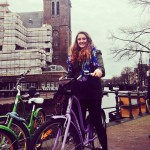During the summer holiday, I took part in a research placement with Dr Pallavi Anand in the School of Environment, Earth and Ecosystem Sciences at the Open University, organised by the Nuffield Foundation. The placement involved coding a MATLAB toolkit to a more accessible program such as Python that would use paleoclimate data to solve for past seawater temperature, oxygen isotope and salinity.
Category Archives: Intern
Geochemistry of the deep-sea mud to understand Monsoon
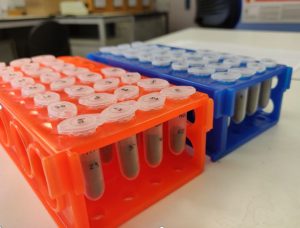
Samples crushed into a fine powder.
This summer I went on a research experience placement with The Open University’s School of Environment, Earth and Ecosystem Sciences (EEES). This was a seven-week project, funded by NERC (Natural Environment Research Council).
The project was to assist in a calibration of results obtained from deep-sea core sediment samples from two different sites around the Bay of Bengal.
The calibration is part of a wider project that my colleague, Emmeline Gray is working on for her PhD. This is looking at how the Indian Summer Monsoon (ISM) behaved during a past warm period (similar to predicted future conditions) by observing how certain parameters in the sea floor sediments at these sites vary over time. This could give an insight as to how climate change might affect our oceans over time.
Supporting a Nuffield Research Student
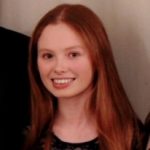
Sophie Alexander, The Open University.
Over the summer, I mentored a Nuffield Research Student.
I was originally interested in getting involved in the scheme to gain experience in teaching and mentorship.
The student, Zaibaa, worked to complete a pilot study, the results of which are now actively informing my PhD research direction.
My time mentoring Zaibaa was really valuable; it challenged me to teach the scientific method of hypothesis testing to someone else.
Further to this, I gained experience in project management and how to give feedback – which was harder than I thought!
I’d highly recommend other PhD students consider designing and mentoring a Nuffield student in the future, particularly if you’re interested in gaining experience of supervising projects.
Dr Pallavi Anand (project providers) supported my work as my PhD supervisor. I’m grateful for the the opportunity and funding from Nuffield Foundation.
Fishing in the Atlantic!
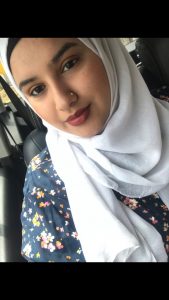
Zaibaa Mehmood, Luton Sixth Form College.
During my summer holidays, after my first year at college, I took part in a Nuffield research placement at the School of Environment, Earth and Ecosystem Sciences (EEES) at the Open University.
During this placement, I worked alongside a PhD student Sophie Alexander to analyse marine sediment (or mud in simple terms).
The main aim was to investigate surface ocean productivity in the Southern and Atlantic Ocean during the early Eocene. This was broken down for me into smaller aims as below:
- Create smear slides of mud samples from different sites
- Identify components on slides using a polarising microscope
- Compare analysis of 3 different sites and decide what changes there are and how they were caused
- Use the data gained to improve knowledge of ocean productivity during a warm greenhouse period.
Our Brilliant Club PhD student internships
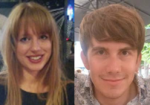
Left: Mairi Walker (maths PhD student). Right: Vincent Trott (recent PhD graduate in history)
The Brilliant Club is an educational charity that works to widen access to higher education by placing postgraduate researchers in non-selective state schools to deliver university-style tutorials based on their research. Not only is this a great chance for researchers to develop their teaching skills and engage non-specialist audiences in their work, it’s also a fantastic opportunity for pupils to carry out their own research and get a taste of what university learning is like.
The Brilliant Club works with higher education institutions around the country, and has a strong partnership with The Open University. Many Open University researchers work as Brilliant Club tutors and recently the partnership has extended to include an internship scheme, sponsored by Santander.
The life of an OU intern – Engaging Research Week 3
Week 3 of my internship on the OU’s PER Catalyst was a bit quieter, but it doesn’t mean I wasn’t busy!
Monday
I spent this day working from home. For a 21 year old this is a very novel idea and it meant that I had to have some serious self control. I have to say that it went very well though, as I hope can be seen in my previous blog.
I also got to comment on the media training film made by OU postgraduate researchers. The piece of OU research they focused on, the field network system, is a collaboration between the OU’s Knowledge Media Institute and the Field Studies Council. The videos was very high quality. I have to say the presenter, Frazer Bird, was very impressive.
The life of an OU intern – Engaging Research Final Week
Another week of media training, this time looking at space science!
Monday
I worked today with the new group of media students from Walton High. I got the chance to meet them last week at the briefing but in the space of a week had managed to forget everyone’s names; obviously not my strong point.
Monday is always the day that the students learn how to interview. Luckily I managed to get out of being the guinea pig and instead got to watch Manisha, the teacher, squirm.
Although very shy to start with the students slowly started to come out of their shells a little, especially when put in front of a camera.
The life of an OU intern – Engaging Research Week 2
Last week I was helping out with a media training week, working with MK College students. The students spent the week learning the skills needed to make a short film focusing on a research project being run by the OU. This particular training focused on the nQuire platform. Here’s my run down of the week:
The life of an OU intern – Engaging Research Week 1
Blogging is something slightly alien to me, especially in an academic sense. As an Open University intern it is part of my role to blog about what I’m doing and quite simply, it seems that the activities I’m currently a part of are just too interesting to keep from you all!

